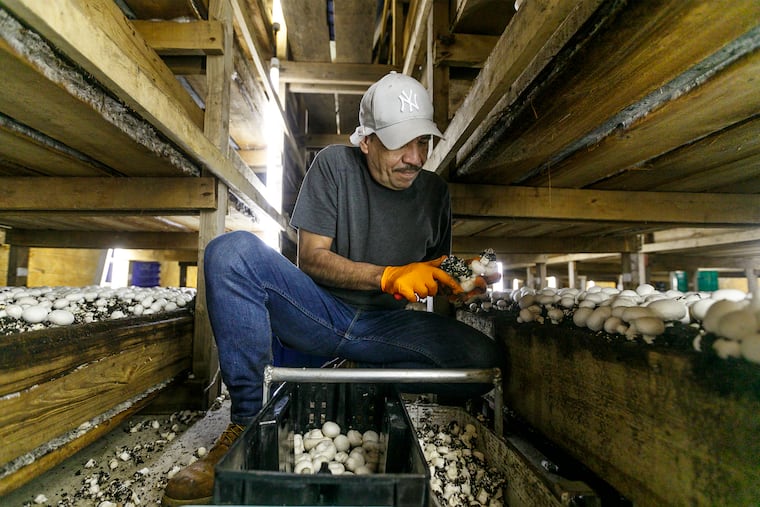‘There’s no one around’: Pa. farmers faced with labor shortage
Amid stringent immigration enforcement, Pennsylvania's farmers say finding and keeping workers has become increasingly difficult.

At Phillips Mushroom Farms in Kennett Square, business is booming and the owners would like to expand. But they can’t.
There aren’t enough harvesters, the people who rise before dawn to work in dark grow houses rapidly cutting mushrooms loose from their beds.
“There’s no one around,” said Jim Angelucci, the farm’s general manager. “And it’s not just the mushroom industry. Everyone is struggling for workers.”
Amid renewed federal emphasis on immigration enforcement, farmers are experiencing a shortage of labor. It’s a problem for virtually all enterprises that rely on difficult manual work, but it’s especially pronounced in agriculture, where farmers rely largely on immigrants — some of them undocumented.
In Pennsylvania, the shortage of workers has disproportionately affected farmers — mushroom, dairy, and others.
In New Jersey, Dory Dickson, director of the Medford-based volunteer organization Migrant Worker Outreach, said local farms have substantially fewer workers this year than in previous years.
Farming and mushroom harvesting is a skill, “and some people just don’t have it,” said Megan Klotzbach, regulatory manager at Mother Earth Organic Mushrooms in Landenberg, Chester County. Beyond that, she said, fear of deportation has sent some undocumented immigrants — long a staple of farmwork — back to their homelands. “What we really need,” she said, “is some immigration reform.”
Meanwhile, some mushroom and dairy farmers desperate for labor have begun to turn to places they may not have once considered, such as inmate work-release programs, organizations that help the visually impaired find employment, and others that help veterans find work. While the programs have been met with mixed success, overall they aren’t “moving the needle,” Klotzbach said.
The job of a mushroom harvester is a “hard sell,” said Stephanie Chapman, director of human resource management at Phillips Mushroom Farms. Full-time positions require workers to pick six days a week, including holidays. Days start early and the work can be difficult, as workers have to bend between narrow, dimly lit wooden mushroom beds, knife in hand, and delicately cut thousands of mushrooms piece by piece. Harvesters are rewarded with a bonus — an amount Chapman declined to disclose — for picking extra quickly.
“One of the biggest problems in agriculture and dairy is that American citizens no longer want to work like that,” said Christian Landis, owner of Worth the Wait Farm, a dairy operation in Stevens, Lancaster County. “And immigrants — illegal or legal — are the only ones who are willing to step up to the plate to serve these positions.”
The lack of workers is so pronounced that some mushroom farms, like Phillips, can’t cleanly pick their last harvest cycle.
Dairy farmers, mired in a struggling milk market, have seen even thinner profit margins as they push to find workers.
“It’s getting really bad,” said Caroline Novak, deputy director of the Professional Dairy Managers of Pennsylvania, a trade association in Harrisburg. “Quite honestly, they’re dirty jobs. They pay far above minimum wage, but they are dirty jobs. You’re behind cows. You’re going in and out of rain, snow, sleet, and hail.”
The labor shrinkage, combined with falling milk prices, she said, has forced some dairy farmers to downsize and others to postpone plans to upgrade to robotic milking machinery.
Mushroom farms are managing to stay afloat, although some say operations aren’t what they once were.
“We just used to always have people coming in, and we’re just not seeing that in the last five years,” said Klotzbach, of Mother Earth Organic Mushrooms. “They [workers] are not feeling happy with the country, or they’re not feeling they want to be here. A lot of them are just going home, whether that be Mexico or somewhere else, and they don’t know if they’re coming back or not.”
Still, mushrooms farms like Phillips have managed to retain some workers for decades, such as J. Trinidad Perez, 54, a 32-year employee who said he legally immigrated from Guanajuato, Mexico, in 1985 and now works as a harvesting supervisor. Phillips credits retention to on-site housing, retirement plans, vacation days, and medical coverage they’ve invested in to remain attractive to prospective employees who have their choice of mushroom farms to work at in southern Chester County.
But even so, the next generation of labor is far from guaranteed when mushroom workers’ children, many of whom were born and raised in the United States, want to work in another industry, Klotzbach said.
As it stands, current farm laborers are shouldering more responsibility as fewer employees are available, said Kathleen Sexsmith, an assistant professor of rural sociology at Penn State-University Park who interviewed 60 Chester County mushroom farm laborers from Latin America as part of her yearlong research into the industry’s labor shortage. “Their workday gets very long,” she said.
Her research found that workers would often start their day at 5 a.m. and not finish until 5 p.m., though they were to clock out at 1 or 2 p.m.
It’s a similar situation for dairy workers, who work “until the job’s done,” said Landis, the dairy farmer.
“The American public as a whole does not want to work these hours anymore,” he said. “And quite frankly, if the immigrant labor force was not there, there would be a major void in the labor force of the agriculture industry across all sectors.”